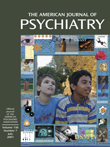Cytokines in Clinical Psychiatry
To the Editor: As pointed out by Ziad Kronfol, M.D., and Daniel G. Remick, M.D. (1), recent developments in the neurobiology of cytokines have opened exciting perspectives for psychiatry. A review on this topic for the information of clinical psychiatrists, therefore, is fully justified and timely. However, the review by Drs. Kronfol and Remick suffers from a number of approximations, omissions, and even gross mistakes that do not allow the readership to fully appreciate the importance of the field and its exact implications.
In contrast to what Drs. Kronfol and Remick presented, cytokines are not ready-made hormones of the immune system that are secreted into the bloodstream to reach their target organs, but communication signals that are produced only when needed and, once released, act in a paracrine and autocrine manner. This means that, unlike hormones, circulating levels of cytokines tell nothing about the functional state of the affected organ. Clinical findings on the cytokine system in psychiatric patients need, therefore, to be put into perspective. Most of the data regarding depressed patients come from a report by Maes (2), and they are not easily replicable. The strength of the article lies more in the convergence of different lines of research, from antidepressant drugs’ attenuation of the effects of cytokines on the brain to the psychiatric side effects of cytokines (3). Also, alterations in the peripheral cytokine system of patients with schizophrenia are nonspecific concomitants of activation of the brain cytokine system that are associated with brain swelling and disruption of the blood-brain barrier during acute exacerbations of the disease (4, 5). Causal factors are still uncertain but include autoimmunity, prenatal virus infection, and transcriptional activation of endogenous retroviruses. Concerning the side effects of cytokines, several important new findings are missing from the article, especially the early occurrence of mood disorders (5) and the demonstration of an individual vulnerability to these effects (6). Other major omissions, despite their relevance to the consultation-liaison psychiatrist, include the high prevalence of psychiatric disorders with conditions of chronic inflammation and the alterations in mood and cognition in AIDS patients.
1. Kronfol Z, Remick DG: Cytokines and the brain: implications for clinical psychiatry. Am J Psychiatry 2000; 157:683-694Link, Google Scholar
2. Maes M: Major depression and activation of the inflammatory response system. Adv Exp Med Biol 1999; 461:25-46Crossref, Medline, Google Scholar
3. Dantzer R, Wollman E, Vitkovic L, Yirmiya R: Cytokines and depression: fortuitous or causative association? Mol Psychiatry 1999; 4:328-332Crossref, Medline, Google Scholar
4. Rothermundt M, Arolt V, Weitzsch C, Eckhoff D, Kirchner H: Immunological dysfunction in schizophrenia: a systematic approach. Neuropsychobiology 1998; 37:186-193Crossref, Medline, Google Scholar
5. Capuron L, Ravaud A, Dantzer R: Early depressive symptoms in cancer patients receiving interleukin 2 and/or interferon alfa-2b therapy. J Clin Oncol 2000; 18:2143-2151Google Scholar
6. Capuron L, Ravaud A: Prediction of the depressive effects of interferon alfa therapy by the patient’s initial affective state (letter). N Engl J Med 1999; 340:1370Crossref, Medline, Google Scholar



